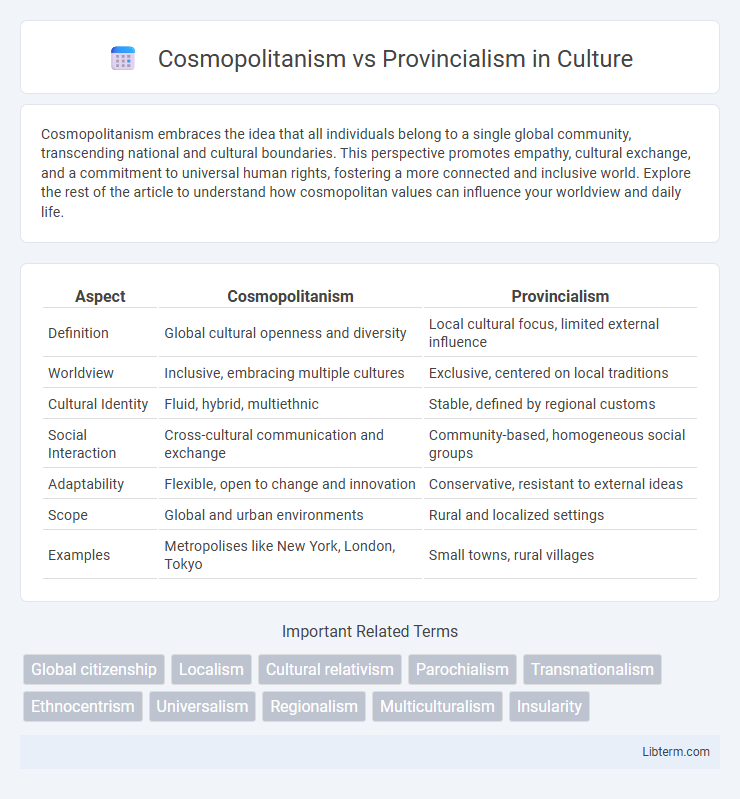Cosmopolitanism embraces the idea that all individuals belong to a single global community, transcending national and cultural boundaries. This perspective promotes empathy, cultural exchange, and a commitment to universal human rights, fostering a more connected and inclusive world. Explore the rest of the article to understand how cosmopolitan values can influence your worldview and daily life.
Table of Comparison
| Aspect | Cosmopolitanism | Provincialism |
|---|---|---|
| Definition | Global cultural openness and diversity | Local cultural focus, limited external influence |
| Worldview | Inclusive, embracing multiple cultures | Exclusive, centered on local traditions |
| Cultural Identity | Fluid, hybrid, multiethnic | Stable, defined by regional customs |
| Social Interaction | Cross-cultural communication and exchange | Community-based, homogeneous social groups |
| Adaptability | Flexible, open to change and innovation | Conservative, resistant to external ideas |
| Scope | Global and urban environments | Rural and localized settings |
| Examples | Metropolises like New York, London, Tokyo | Small towns, rural villages |
Defining Cosmopolitanism: Beyond Borders
Cosmopolitanism transcends national and cultural boundaries, embracing a global identity that values diversity, interconnectedness, and shared human rights. It promotes openness to different perspectives and lifestyles, fostering inclusivity and mutual respect beyond geographic limitations. This philosophy contrasts with provincialism's focus on local traditions and parochial interests, urging individuals to engage with worldwide challenges and opportunities.
Understanding Provincialism: Local Loyalties
Provincialism reflects deep-rooted local loyalties that shape individuals' identities through community traditions, cultural norms, and regional values. These localized attachments often influence social behaviors and perceptions, fostering a strong sense of belonging and resistance to external or global influences. Understanding provincialism requires examining how such parochial mindsets impact social cohesion, political preferences, and responses to globalization.
Historical Roots of Cosmopolitan Thought
Cosmopolitanism traces its historical roots to ancient Greek philosophy, notably through Diogenes of Sinope, who emphasized a universal human identity beyond local affiliations. The Stoics further developed this idea by advocating for a global community bound by reason and common ethics. During the Enlightenment, thinkers like Immanuel Kant reinforced cosmopolitan ideals by promoting perpetual peace and moral duties that transcend national borders.
Provincialism in Tradition and Culture
Provincialism in tradition and culture emphasizes local customs, values, and identities, often prioritizing the preservation of heritage over global influences. This focus fosters strong community bonds and a deep connection to historical practices, but may limit openness to new ideas and cultural exchange. The tension between maintaining provincial cultural integrity and adapting to cosmopolitan diversity highlights the challenges of balancing tradition with modernity.
The Role of Identity in Global and Local Perspectives
Identity shapes the tension between cosmopolitanism and provincialism by influencing how individuals relate to global and local contexts. Cosmopolitan identity embraces diversity and global interconnectedness, promoting open-mindedness and cross-cultural understanding. Provincial identity emphasizes local traditions and community belonging, often prioritizing familiar customs and localized perspectives over global integration.
Cosmopolitanism and Global Citizenship
Cosmopolitanism emphasizes the idea of global citizenship, encouraging individuals to transcend local or national identities in favor of a shared human community that values diversity and universal rights. This philosophy supports cross-cultural dialogue, global cooperation, and ethical responsibility towards all people, fostering a sense of belonging that is not confined by geographical boundaries. Embracing cosmopolitanism promotes social justice, sustainability, and mutual understanding in an increasingly interconnected world.
Provincialism’s Impact on Community Values
Provincialism often reinforces insular attitudes that prioritize local customs and traditions, potentially limiting openness to diverse perspectives and innovation. This inward focus can strengthen community bonds through shared values but may also hinder social and cultural progress by resisting external influences. The impact of provincialism on community values manifests in a heightened emphasis on conformity and preservation of identity at the expense of inclusivity and broader global awareness.
Media, Communication, and the Spread of Ideas
Media and communication technologies play a pivotal role in shaping cosmopolitanism by facilitating the rapid exchange of diverse ideas across global networks, transcending provincial limitations. Digital platforms enable cross-cultural dialogues and the dissemination of information that challenge localized worldviews, promoting a more interconnected and inclusive global community. The spread of ideas through mass media and social networks often diminishes provincialism by fostering awareness and understanding of different cultural, social, and political perspectives worldwide.
Economic Implications: Global Markets vs Local Economies
Cosmopolitanism promotes integration into global markets, enhancing access to diverse resources, investments, and innovation, which can drive economic growth and competitiveness on an international scale. Provincialism emphasizes support for local economies by fostering community-based businesses, preserving cultural heritage, and sustaining regional employment, often prioritizing economic resilience over rapid expansion. The economic implications involve a trade-off between the benefits of globalization, such as economies of scale and market diversification, and the preservation of local economic stability and identity in the face of global competition.
Navigating the Balance: Building Inclusive Societies
Navigating the balance between cosmopolitanism and provincialism requires fostering inclusive societies that embrace global interconnectedness while respecting local identities and traditions. Emphasizing cross-cultural dialogue, equitable resource distribution, and shared values promotes social cohesion and mitigates conflicts rooted in cultural or regional differences. Inclusive policymaking and education systems that highlight diversity and global citizenship create resilient communities capable of thriving in an interconnected world.
Cosmopolitanism Infographic

 libterm.com
libterm.com